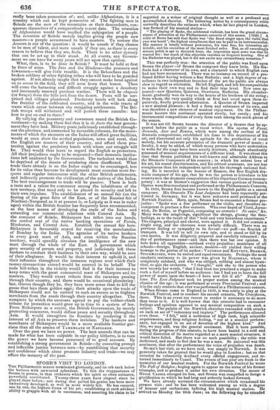TRADE ON THE INDUS.
A FINAL judgment of the transactions in Scinde cannot be pronounced until the whole of the facts are before the public. That the aggression has been on the part of England seems beyond dispute, but when that aggression commenced does not so clearly appear. Lord ELLENBOROUGH'S movement may have been rendered inevitable by antecedent operations. The English Government has been coquetting and tampering with the territories on the Indus for many years back. Only the official records of those years (perhaps not even they) can show how far each successive meddler advanced beyond his predecessor; how far each was aware of what must be the inevitable end of the course he was pursuing; in what proportions the responsibility for the subjugation of Scinde must be apportioned among all who have been directly or indirectly instrumental to it.
But though judgment on the past must be deferred, the practical question what is to be done must be decided immediately. He knows but little of the British or of any other government who thinks Scinde will or can be given up. Unlike Afghanistan, it has
really been taken possession of; and, unlike Afghanistan, it is a country which can be kept possession of. The fighting men in
Scinde are the men of the mountains or their descendants, con
querors themselves of a comparatively rccent date. The retention 4>f Afghanistan would have implied the subjugation of a people.
The retention of Scinde merely implies giving the people new masters—a people accustomed to have masters. To restore the Ameers is out of the question : it would be unsafe if they chance to be men of talent, and more unsafe if they are, as there is every reason to believe that they are, fools. There is no other dynasty that can be set up in their stead. At all events, any Government we can have for many years will act upon that opinion. What, then, is to be done in Scinde? It must be held at first by force of arms. The Jets and the Hindoos—the peasants and townsmen—will give little trouble. It is the Beloochees and the broken soldiery of other fighting tribes who will have to be guarded against. If not already taught that they cannot make head against
us en masse in the field, they will soon learn that lesson. Then will come the harassing and difficult struggle against a desultory and incessantly renewed partisan warfare. There will be chupaos
.(or forays) from the bills and from the desert. Posts will be sur
prised and villages plundered. Predatory bands will lurk along the frontier of the cultivated country, and in the wide tracts of waste which occur between the straggling settlements. The British troops will withstand and will punish these assaults : but bow to put an end to them ?
By rallying the peasantry and townsmen round the British Government—by making them feel that it is de facto the best govern
ment they have had. Military posts judiciously established through out the province, and connected by moveable columns, for the movements of which the steamers on the Indus will afford great facilities, would at once show the settled population, town and rural, that the English are masters of their country, and afford them protection against the predatory bands with whom our struggle will be. They would thus learn to regard the English as protectors. All their prejudices ought to be respected—their domestic institutions left unaltered by the Government. The turbulent would thus be deprived of the means of rendering them disaffected. What trade there already is on the Indus ought to be encouraged, less for its value than because its development must occasion more fre quent and regular intercourse with the older British settlements,
and indirectly promote the civilization of the natives of the Indus. The best encouragement to trade will be passive. There is both
a taste and a talent for commerce among the inhabitants of the new territory, that need only to be placed in security and left to their own impulses. The establishment of an annual fair (on the footing of the great fairs of the East, or of the Russian fair of Nischnei-Novgorod as it at present is, or Leipzig as it was in ruder ages) within the British frontier has frequently been recommended, as the best means of developing the trade of the Indus and extending our commercial relations with Central Asia. By the conquest of Scinde, Shikarpore has fallen into our hands, the central seat of the native banking operations of Persia, Ilindostan, and Central Asia. Establish the annual fair here. .Shikarpore is favourably seated for receiving the merchandise of Bombay by the Indus. The agencies of its native bankers in every great mart of Asia, and even within the Russian territory, would speedily circulate the intelligence of the new Inert through the whole of the East. A government which gave security of person and property, and judiciously left these bankers to conduct their business in their own way, would be sure of their allegiance. It would be their interest to uphold it, and their influence throughout the immense regions over which their money-transactions extend would be exerted in its behalf. The rude hill-tribes in the vicinity would find it for their interest to keep terms with the great commercial mart of Shikarpore and its masters. They would exact tribute from the caravans passing through tbeir country, and there would be occasional plundering : but, thieves though they be, they have more sense than to kill the goose that lays them golden eggs; their attacks upon the trade of Shikarpore would not be carried to such an excess as to frighten merchants from the roads through their country altogether. The compacts by which the caravans agreed to pay the robber-chiefs tribute for protection would grow up in time to a system of law. From Shikarpore as a centre, the British Government, by merely protecting commerce, would diffuse peace and security throughout Asia. It would strengthen its frontiers by rendering it the interest of all Asia to preserve them inviolate. The bankers and merchants of Shikarpore would be a more available frontier garrison than all the armies of TAMERLANE or NAPOLEON.
Over the past we have no power. The best amends that can be made for what has been culpable in our policy hitherto, is to turn the power we have become possessed of to good account. By establishing a strong government in Scinde—by executing prompt and inflexible justice between men—by establishing that security and confidence which alone promote industry and trade—we may efface the memory of the past.



























 Previous page
Previous page